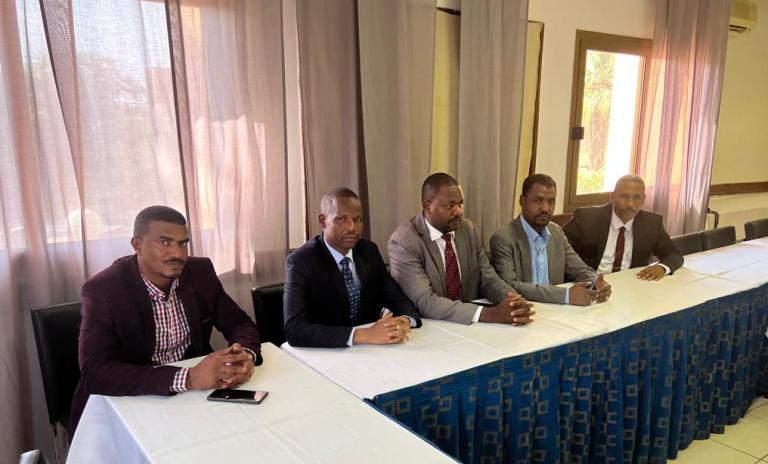Sudanese officials, Darfur rebels discuss peace and return from Libya
June 11, 2022 (NIAMEY) – Sudanese government delegation held informal talks with seven armed factions from the Darfur region in Niger’s capital to discuss ways to join the peace process in Sudan and end their presence in Libya.
On Thursday, several rebel factions based in Libya signed the “Democratic Path Forces”, calling to complete peace in Sudan, end war and address the root causes of the Sudanese crisis.
The declaration was followed by a two-day meeting (10-11 June) with a government delegation in Niamey held under the auspices of the Promediation Organization, a French NGO including professional mediators and experts in the field of mediation and negotiation.
The government delegation to the talks was led by the head of military intelligence, Major General Mohamed Ahmed Sabir and included Maj Gen Hamza Youssif Burah of the General Intelligence Service and three other military officers.
The rebel factions that took part in the meeting are the Revolutionary Awakening Council, of the tribal leader Musa Hilal, the New Sudanese Justice and Equality Movement (NSJEM) led by Mansour Arbab, the Revolutionary Movement for Justice and Equality led by Yassin Osman, the Sudan Liberation Movement-Independent leadership headed by Abbas Ahmed Aseel (aka Jebel Moon), the Awakening Council– Collective Leadership led by Ali Al-Safana, the Corrective Justice and Equality Movement headed by Zakaria Aldash and the Revolutionary Awakening Council for Change and Reform led by Abdallah Hussein.
“The aim of this informal, preliminary meeting, (between) non-signatory armed movements based in Libya and a high-level government’s delegation, was to discuss the inclusion of these movements in the peace process,” Eric Blanchot Promediation’s Director-General told the Sudan Tribune.
Also, the process seeks to ensure “the withdrawal of their fighters from Libya and reintegration in the security forces and society,” Blanchot further stressed.
He added that the success of this process, which would contribute to the stabilization of both Sudan and Libya, requires the support of the international community.
Darfur armed movements sought refuge in Libya where they served as mercenary groups alongside the warring parties.
However, their continued presence in Libya is no longer desired as the international community seeks to bring stability to the North African country.
Also, the military rulers seem interested to bring back home the armed groups who are seen as potential allies in their power struggle with the civilian forces.
During the discussions, the parties agreed on the need to expedite the implementation of security arrangements, a matter that requires huge financial means.
NSJEM leader Arbab told the Sudan Tribune that the discussions on security arrangements focused on the technical details such as the assembly sites, DDR process and timetable for the return of fighters present in Libya.
“The parties agreed to continue their efforts to advance the technical, logistical and financial aspects of this process,” he added.
Several rebel leaders pointed to the failure to implement the security arrangement agreed in the Juba Peace Agreement and insisted on the need for more guarantees that their fighters would be integrated quickly.
Arbab further criticized the Juba Peace Agreement. He said it had caused numerous problems in Darfur. Also, he accused the signatory groups of excluding influential groups.
The participants discussed if there is a need for a new deal or to join the Juba peace deal.
Ismail Agbach, the rapporteur of the “Democratic Path Forces”, told the Sudan Tribune that the government delegation, Niger’s government and Promediation put two proposals on the table the first is to join the political process facilitated by the tripartite mechanism (which means joining Juba process) or reach a new peace agreement.
“We believe that the (Juba agreement) and the tripartite mechanism will not lead to radical solutions to the political crisis. So, we have proposed a new agreement with the government under the auspices of the international community,” he said.
The groups that are taking part in the process include Arab and Massalit factions.
The Sudan Liberation Movement of Abdel Wahid al-Nur and its commander in Libya Youssif Karakula are not part of the process as the holdout group rejects any talks with the military component.
Also, Abdallah Banda, an ICC-wanted rebel commander for war crimes, did not join the initiative.
Also, it is not clear how the process will deal with signatory groups that still keep some fighters in Libya such as the SLM Minni Minnawi.
A source close to the process told the Sudan Tribune the international community may abstain from supporting the initiative because of the coup d’état and the absence of a civilian government.
(ST)

